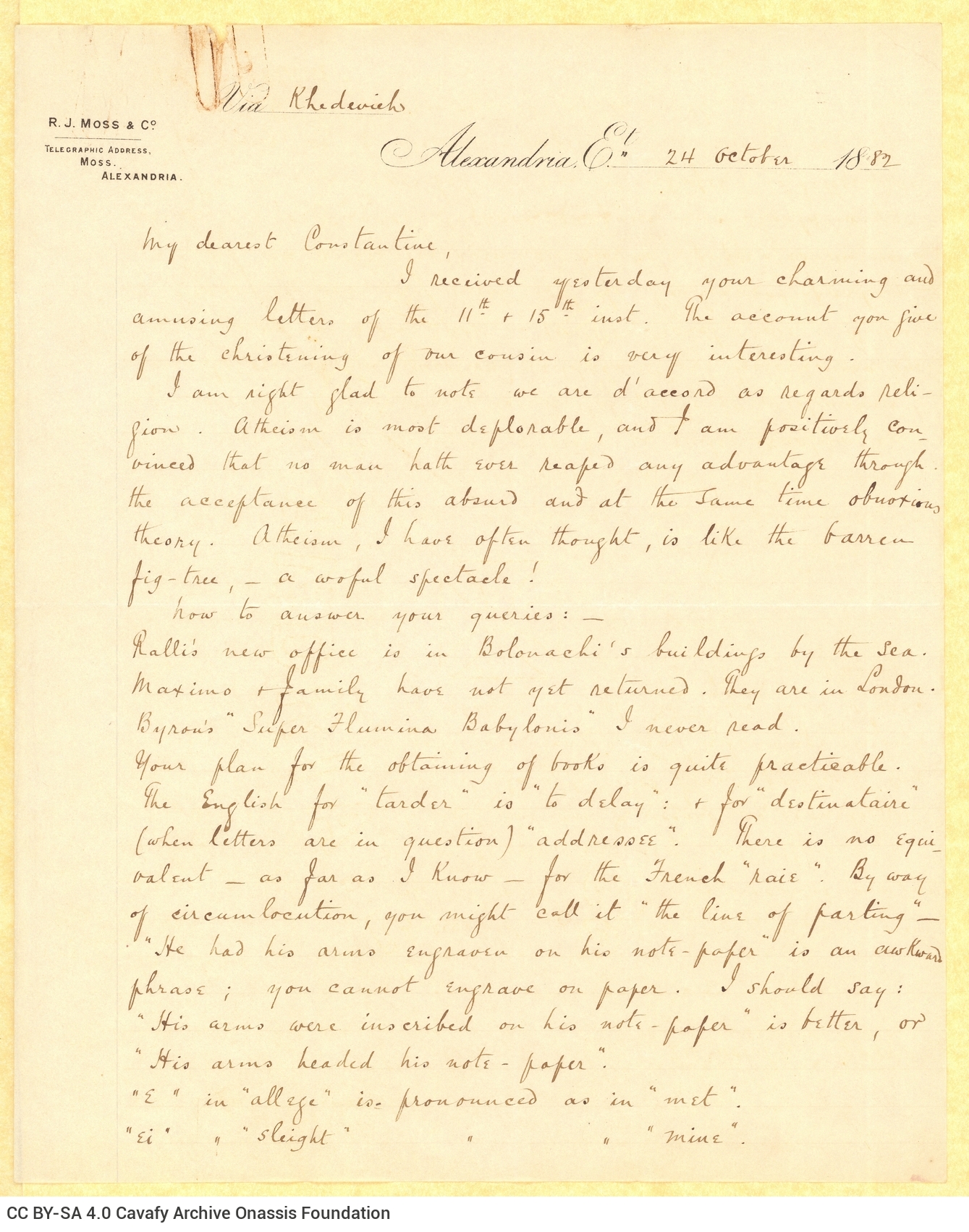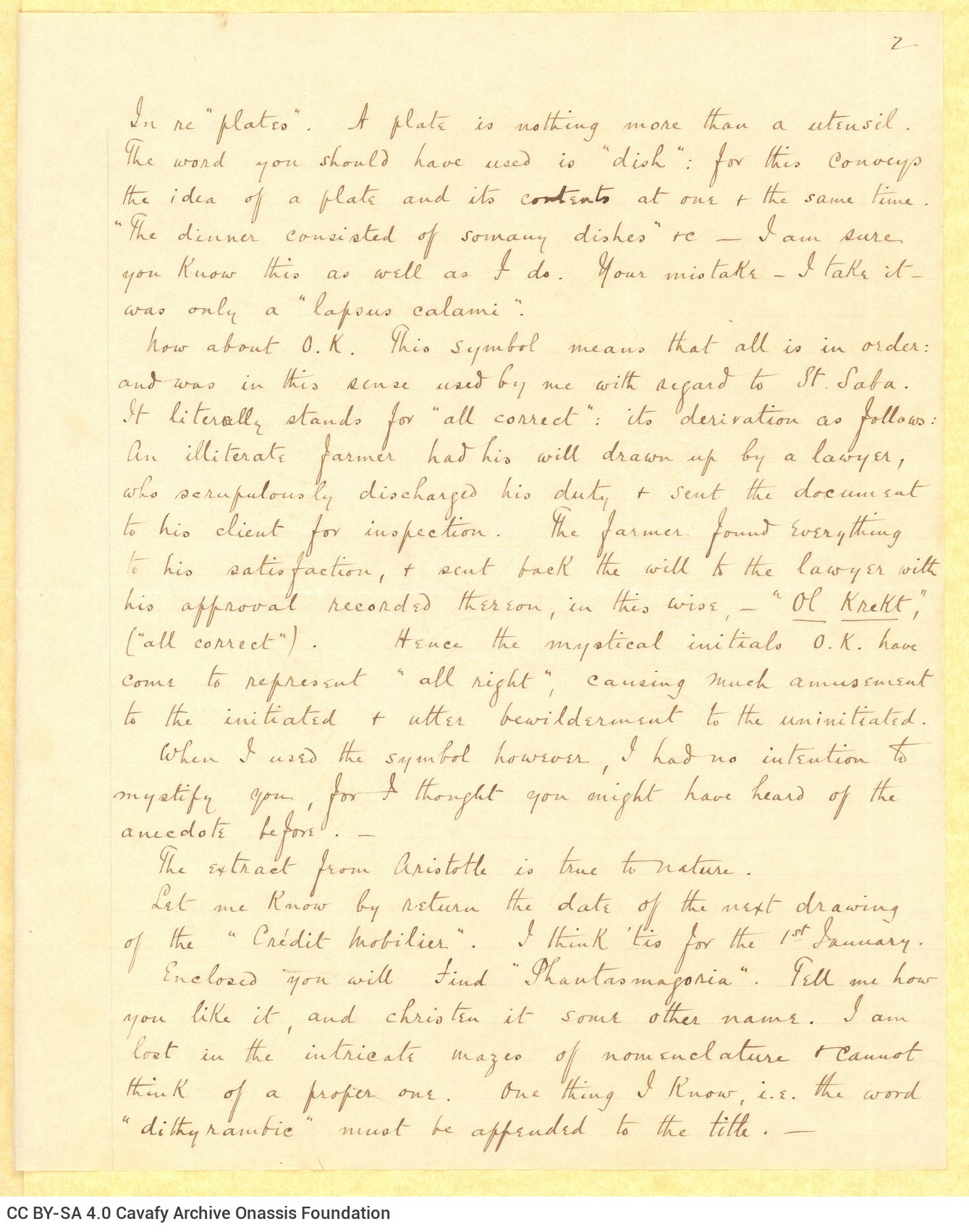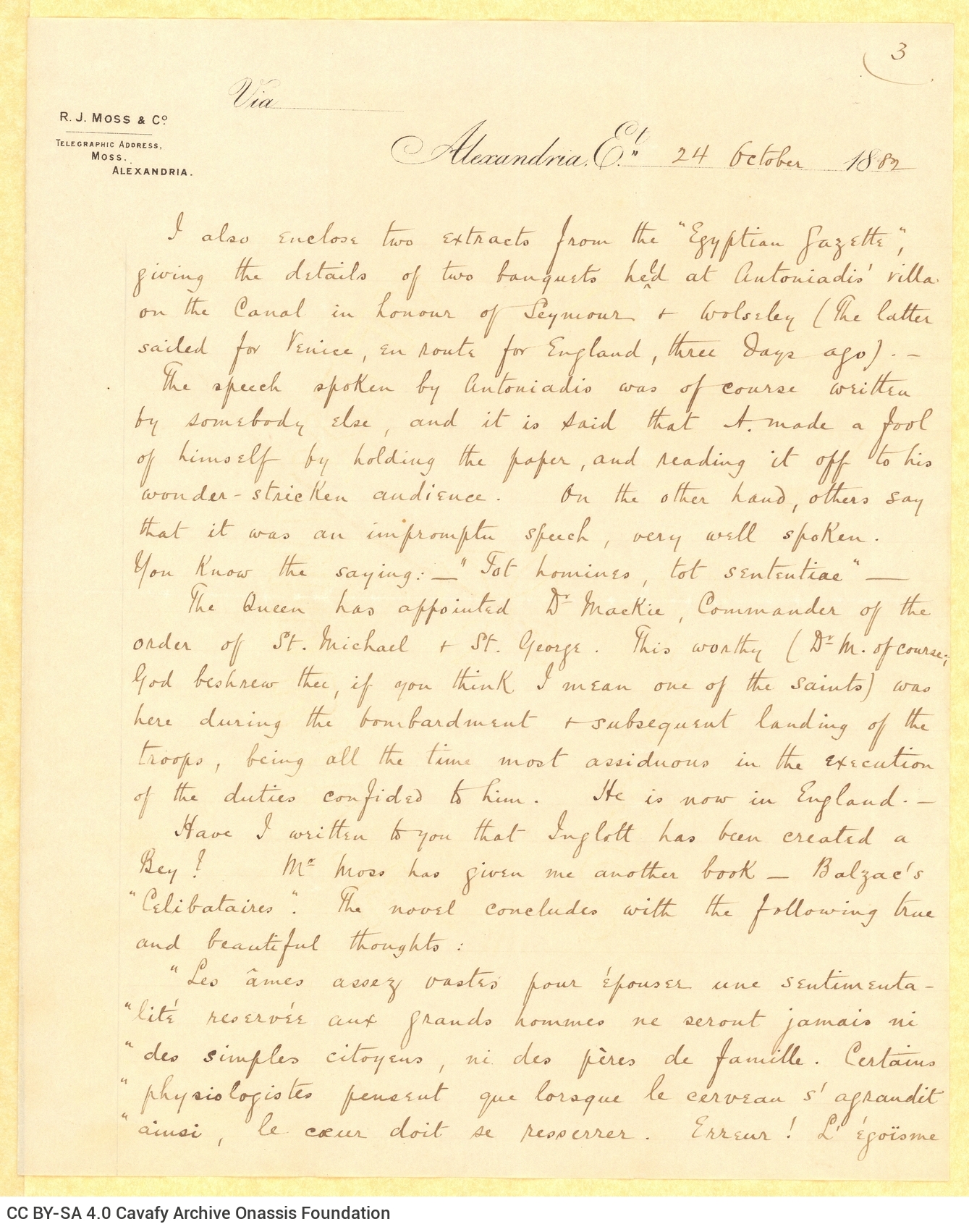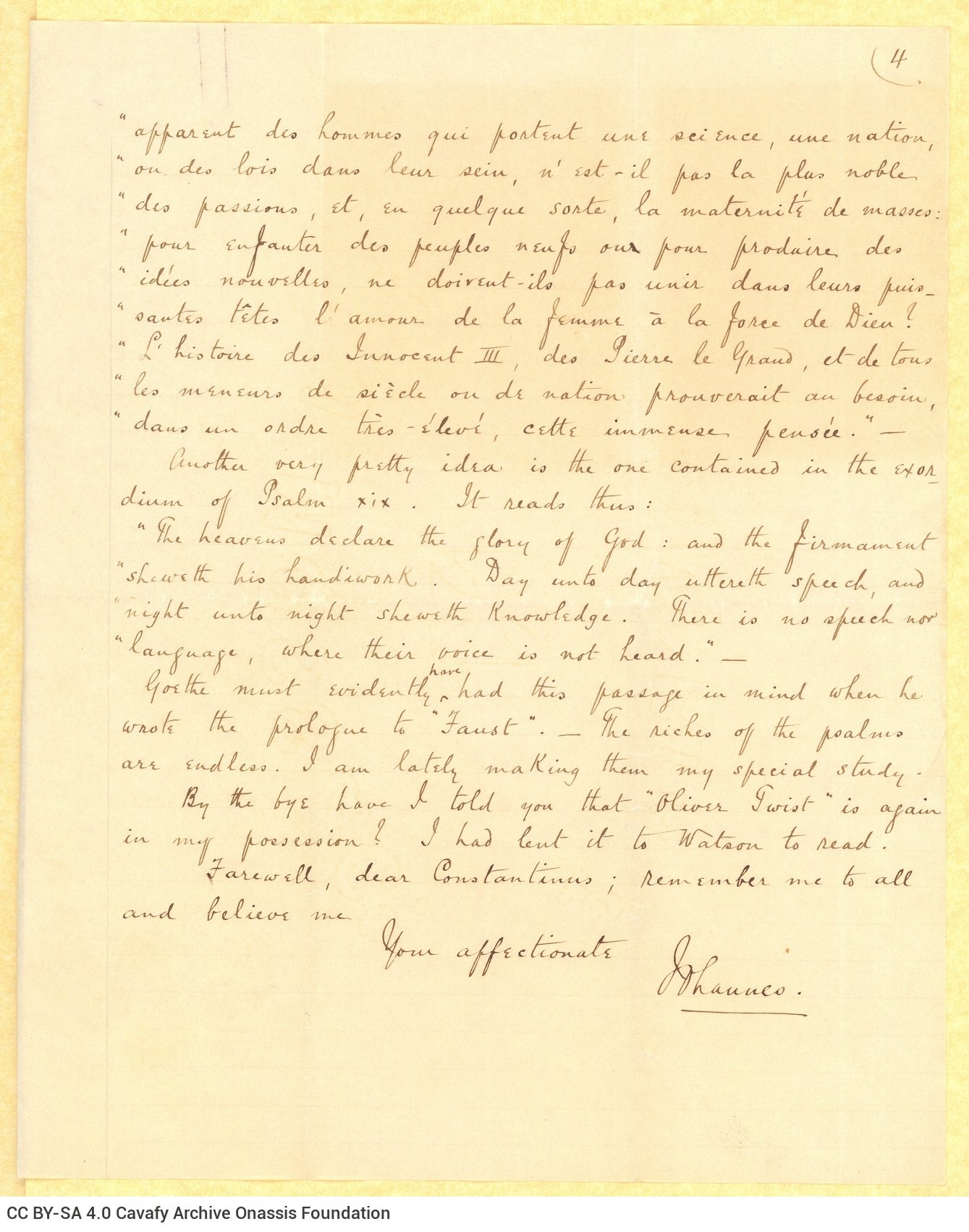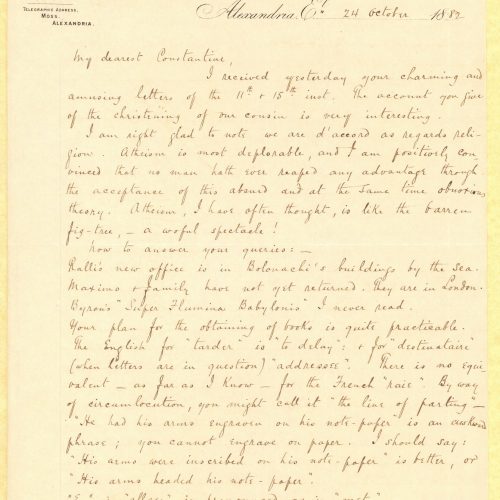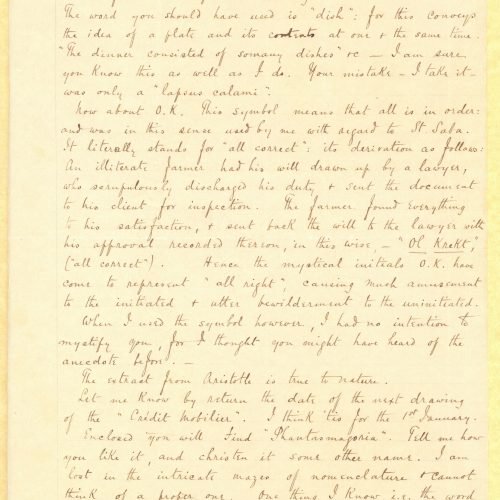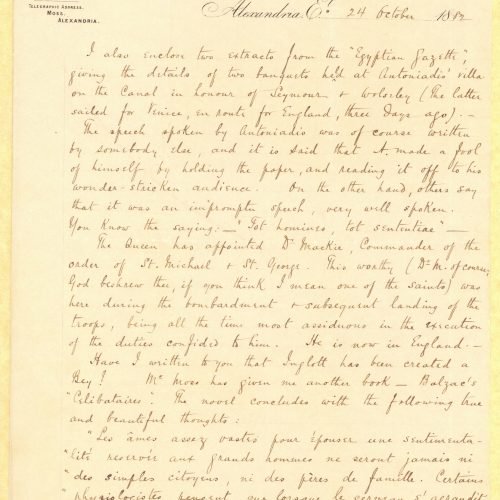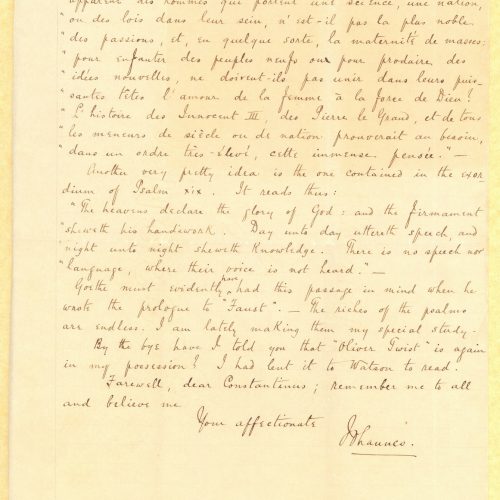Επιστολή του John Καβάφη προς τον Κ. Π. Καβάφη
[Alexandria] 24 October 1882
[Via] Khedevieh
My dearest Constantine,
I received yesterday your charming and amusing letters of the 11th and 15th instant. The account you give of the christening of our cousin is very interesting.
I am right glad to note we are d’accord as regards religion. Atheism is most deplorable, and I am positively convinced that no man hath ever reaped any advantage through the acceptance of this absurd and at the same time obnoxious theory. Atheism, I have often thought, is like the barren fig-tree, ― a woeful spectacle!
Now to answer your queries: ― Ralli’s new office is in Bolonachi’s buildings by the sea.
Maximo and family have not yet returned. They are in London. Byron’s “Super Flumina Babylonis” I never read. Your plan for the obtaining of books is quite practicable.
The English for “tarder” is “to delay”: and for “destinataire” (when letters are in question) “addressee”. There is no equivalent ― as far as I know ― for the French “raie”. By way of circumlocution, you might call it “the line of parting” ―
“He had his arms engraven on his note-paper” is an awkward phrase; you cannot engrave on paper. I should say: “His arms were inscribed on his note-paper” is better, or “His arms headed his note-paper”.
“e” in “allege” is pronounced as in “met”
“ei” in “sleight” is pronounced as in “mine”.In re “plates”. A plate is nothing more than a utensil. The word you should have used is “dish”: for this conveys the idea of a plate and its contents at one and the same time. “The dinner consisted of so many dishes etc ― I am sure you know this as well as I do. Your mistake ― I take it ― was only a “lapsus calami”.
Now about O.K. This symbol means that all is in order: and was in this sense used by me with regard to St. Saba. It literally stands for “all correct”: its derivation as follows: An illiterate farmer had his will drawn up by a lawyer who scrupulously discharged his duty and sent the document to his client for inspection. The farmer found everything to his satisfaction, and sent back the will to the lawyer with his approval recorded thereon, in this wise, ― “Ol Krekt”, (“all correct”). Hence the mystical initials O.K. have come to represent “all right”, causing much amusement to the initiated and utter bewilderment to the uninitiated.
When I used the symbol however, I had no intention to mystify you, for I thought you might have heard of the anecdote before. ―
The extract from Aristotle is true to nature.
Let me know by return the date of the next drawing of the “Crédit Mobilier”. I think ’tis for the 1st January.
Enclosed you will find “Phantasmagoria”. Tell me how you like it, and christen it some other name. I am lost in the intricate mazes of nomenclature and cannot think of a proper one. One thing I know, i.e. the word “dithyrambic” must be appended to the title. ―I also enclose two extracts from the Egyptian Gazette, giving the details of two banquets held at Antoniadis’ villa on the Canal in honour of Seymour and Wolseley (The latter sailed for Venice, en route for England, three days ago). ―
The speech spoken by Antoniadis was of course written by somebody else, and it is said that A. made a fool of himself by holding the paper, and reading it off to his wonder-stricken audience. On the other hand, others say that it was an impromptu speech, very well spoken. You know the saying: ― “Tot homines, tot sententiae” ―
The Queen has appointed Dr. Mackie, Commander of the Order of St. Michael and St. George. This worthy (Dr. M. of course; God beshrew thee, if you think I mean one of the saints) was here during the bombardment and subsequent landing of the troops, being all the time most assiduous in the execution of the duties confided to him. He is now in England. ―
Have I written to you that Inglott has been created a Bey? Mr. Moss has given me another book ― Balzac’s Celibataires. The novel concludes with the following true and beautiful thoughts:
“Les âmes assez vastes pour épouser une sentimentalité reservée aux grands hommes ne seront jamais ni des simples citoyens, ni des pères de famille. Certains physiologistes pensent que lorsque le cerveau s’agrandit ainsi, le cœur doit se resserrer. Erreur! L’égoïsmeapparent des hommes qui portent une science, une nation, ou des lois dans leur sein, n’est-il pas la plus noble des passions, et, en quelque sorte, la maternité de masses: pour enfanter des peuples neufs ou pour produire des idées nouvelles, ne doivent-ils pas unir dans leurs puissantes têtes l’amour de la femme à la force de Dieu? L’histoire des Innocent III, des Pierre le Grand, et de tous les meneurs de siècle ou de nation prouverait au besoin, dans un ordre très-élevé, cette immense pensée.” ―
Another very pretty idea is the one contained in the exordium of Psalm xix. It reads thus:
“The heavens declare the glory of God: and the firmament sheweth his handiwork. Day unto day uttereth speech, and night unto night sheweth knowledge. There is no speech nor language, where their voice is not heard.” ―
Goethe must evidently have had this passage in mind when he wrote the prologue to Faust. ― The riches of the psalms are endless. I am lately making them my special study.
By the bye have I told you that Oliver Twist is again in my possession? I had lent it to Watson to read.
Farewell, dear Constantinus; remember me to all and believe me
Your affectionate
Johannes.
ΠΕΡΙΓΡΑΦΗ ΨΗΦΙΑΚΟΥ ΑΝΤΙΓΡΑΦΟΥ
ΠΕΔΙΟ ΑΝΑΓΝΩΡΙΣΗΣ
43,5 x 27 εκ.
ΠΕΔΙΟ ΠΛΑΙΣΙΟΥ ΠΑΡΑΓΩΓΗΣ
ΠΕΔΙΟ ΠΕΡΙΕΧΟΜΕΝΟΥ ΚΑΙ ΔΙΑΡΘΡΩΣΗΣ
Χειρόγραφη επιστολή του Τζων Καβάφη προς τον Κ. Π. Καβάφη στην πρώτη και την τρίτη σελίδα δύο τετρασέλιδων της εταιρείας R. J. Moss & Co., Alexandria. Οι σελίδες 2-4 αριθμημένες πάνω δεξιά. Σχόλια περί θρησκείας και αθεϊσμού και ενημέρωση για πρόσωπα και πράγματα στην Αλεξάνδρεια. Γλωσσικές παρατηρήσεις και σχόλιο για τη σημασία και την προέλευση του «ΟΚ». Σύντομο παράθεμα στα γαλλικά.
ΠΕΔΙΟ ΟΡΩΝ ΠΡΟΣΒΑΣΗΣ ΚΑΙ ΧΡΗΣΗΣ
Αγγλική κυρίως
Γραφή με μελάνι. Υδατόσημο: R. J. Moss & Co Alexandria. Φθορά φυσικού τεκμηρίου: οξειδώσεις.
ΠΕΔΙΟ ΠΑΡΑΤΗΡΗΣΕΩΝ
Η επιμέλεια των μεταγραφών των επιστολών του Ιωάννη Κωνσταντίνου Καβάφη προς τον Κ. Π. Καβάφη πραγματοποιήθηκε για πρώτη φορά από την Κατερίνα Γκίκα και αναρτήθηκε στον επίσημο διαδικτυακό τόπο του Αρχείου Καβάφη.
Ο Τζων Καβάφης στέλνει στον Κ. Π. Καβάφη το ποιήμά του «Phantasmagoria».
